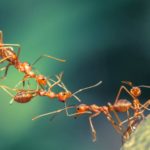 Ants and icebergs are similar in one regard, it’s the whole “tip of the iceberg” saying. Just as what you see above the water is only a very small portion of the iceberg, the ants you see trailing in search of food are only a very small portion of the colony.
Ants and icebergs are similar in one regard, it’s the whole “tip of the iceberg” saying. Just as what you see above the water is only a very small portion of the iceberg, the ants you see trailing in search of food are only a very small portion of the colony.
Typically only 10% of an ant colony will be foraging for food, and they will generally be searching in several different directions. The foragers commonly wander somewhat aimlessly until a food source is discovered. Although the route to the food may have been a long winding one, the return trip will be much more direct and will include a trail for other ants to follow back to the food.
Due to the vast majority of the ant population being hidden away, a slow acting bait or contact pesticide is required to achieve optimum control of the ants. Because of their biology, adult ants are unable to eat solid food, they instead feed solids to the ant larvae. The larvae process the food into a liquid which they then in turn feed to the adult ants.
During the process of sharing food and grooming, the pesticide will be spread throughout the colony, thereby killing as many ants as possible. If the bait or pesticide kills too quickly, it will not achieve the desired results of reaching the hidden ants.
Making the yard as inhospitable as possible to ants will help minimize potential ant colonies. Many ants will nest under anything lying on the ground, so keeping the yard free of leaves and debris will help reduce ant harborage sites. Not leaving pet food outside, having tight fitting trash can lids and keeping the grass cut short are additional steps to help prevent an ant infestation.
Additional measures for ant prevention include sealing cracks or gaps around the foundation of the home. By cutting back vegetation or tree limbs that are touching the siding or overhanging the roof you can decrease easy access to the home for the ants.
If you should experience a problem with ants, or any other pest, please contact Mr. Bugg’s Pest Patrol for an evaluation.

